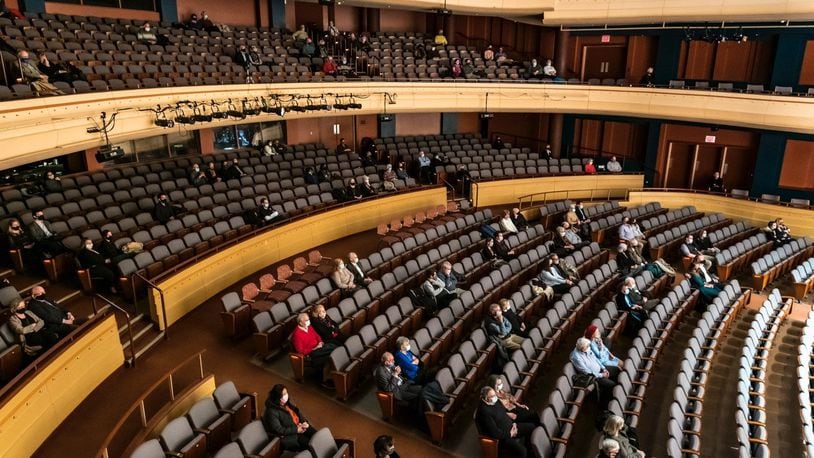Dayton Live is approaching the one-year mark since the initial shutdown of its live performances in response to COVID-19, and the year-to-date data is putting the continuing struggle of Dayton’s top arts organization into perspective. In an average year, Dayton Live has about 550,000 people come to all of its venues. Since the start of the shutdown, however, attendance totals have reached only about 820, according to Sutton.
In October 2020, Dayton Live illustrated what 15% capacity would physically look like inside the Schuster Center’s Mead Theater. During a media event, Dayton Live used bright-colored construction paper to show how different the audience and performer experience would be under COVID-19 restrictions.
The Mead Theater has about 2,300 seats total, meaning 15% capacity should allow for 345 tickets to be purchased. However, to sell seats in properly socially-distanced pairs, only 272 seats could be filled in the theater, Dayton Live staff explained in October.
Although the theater has recently started putting on some small shows under the same state guidelines that were in place in October, Sutton said Dayton’s center for performing arts is far from “actually being open.”
Credit: Staff
Credit: Staff
“It’s a little tiny progress,” Sutton said. “At least for for the symphony and the ballet, it’s nice to hear people clapping, actual people. It’s just — they’re really spread out all over.”
And those performances have resulted in a net financial loss. The purpose of the small, 15% capacity shows, according to Sutton, has been to maintain the connection with patrons and to keep Dayton Live’s mission alive.
“For me, it’s more of a leadership issue where we actively want to be part of the solution,” Sutton said. “We offered our venues for vaccination centers. We are working on how we do that. But I can’t find out tomorrow that we can reopen to 50% and be ready to do that in four months, because I don’t have a staff right now.”
The lack of state guidance and communication with Ohio’s performing-arts officials has been the biggest challenge and frustration for Dayton Live, as it attempts to plan for a potential season in the near future, according to Sutton.
“That’s a real challenge for our industry, especially when you see things like buffets opening, and casinos are running at 50%,” Sutton said. “There was (recently) a variance granted to the Cleveland Cavaliers and Cleveland to have 14% capacity, which is several thousand people at a time now. So it’s becoming a really big issue for our industry.”
Dayton Live has trimmed its costs as much as possible, Sutton said, but it still costs more than $100,000 per week just to maintain the arts group’s facilities and to operate.
“Some people are under this false impression that we’re open,” Sutton said. “But if I put it in perspective, normally in, let’s say, the month of February, I might have 50,000 total visitors among our venues. This February, we’ll have fewer than 1,000. So we’re not open, and I don’t want people to be under that impression.”
Despite the challenges, Sutton said Dayton Live is hopeful that Ohio’s performing arts will hear more concrete directives from the state soon. The organization could be ready to make firm announcements regarding upcoming season performances in the next six to eight weeks.
“We want to be highly confident,” Sutton said. “We could announce something right now, but it wouldn’t be with a great amount of confidence, (because) no one has state permission to reopen at those levels.”
Although Sutton said Dayton Live’s virtual programming has been great, and is a success story on its own, it’s just not the same as sitting next to others and experiencing live music, live comedy and theater, and hearing the clapping of a live audience — things he hopes will return soon.
About the Author
